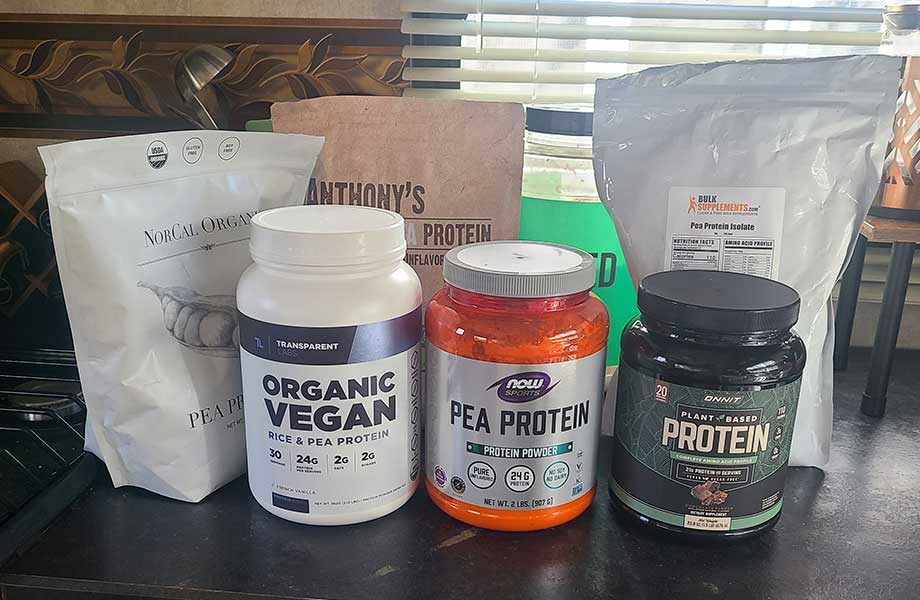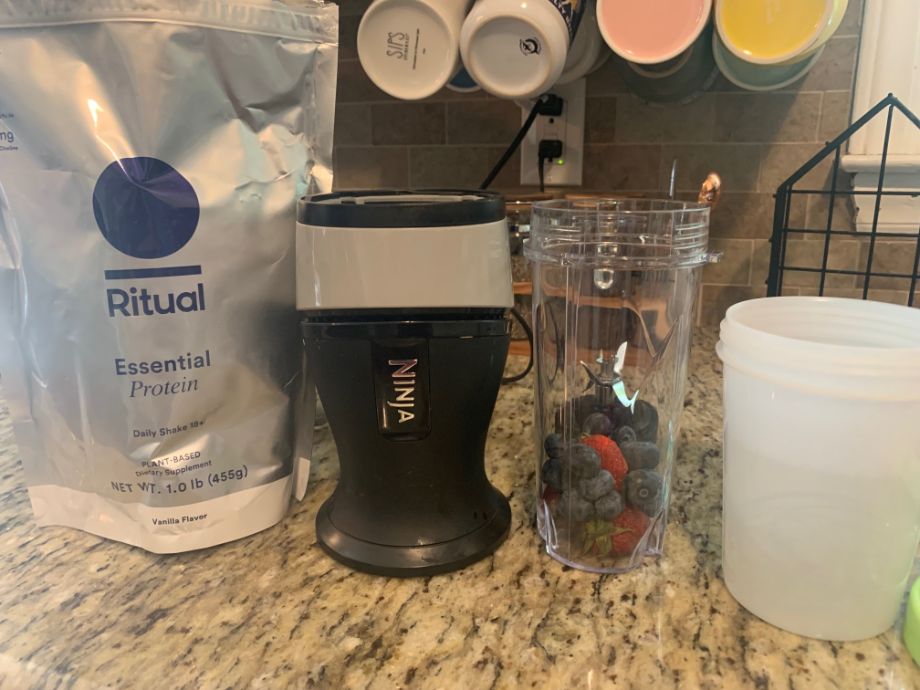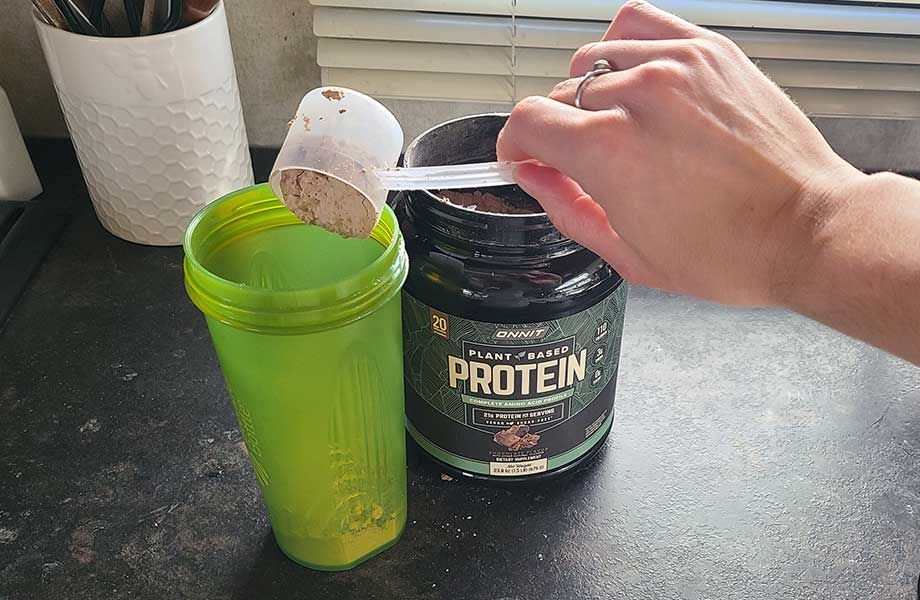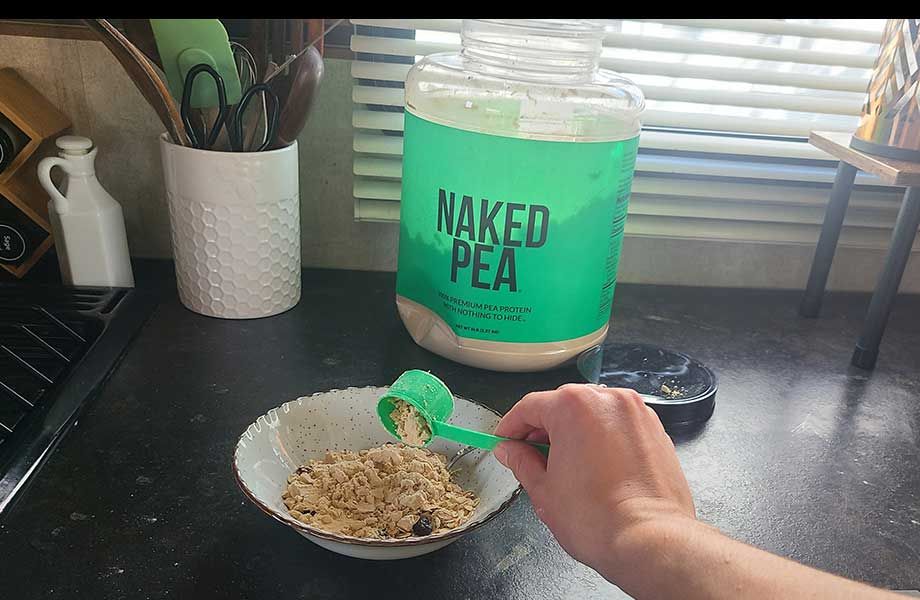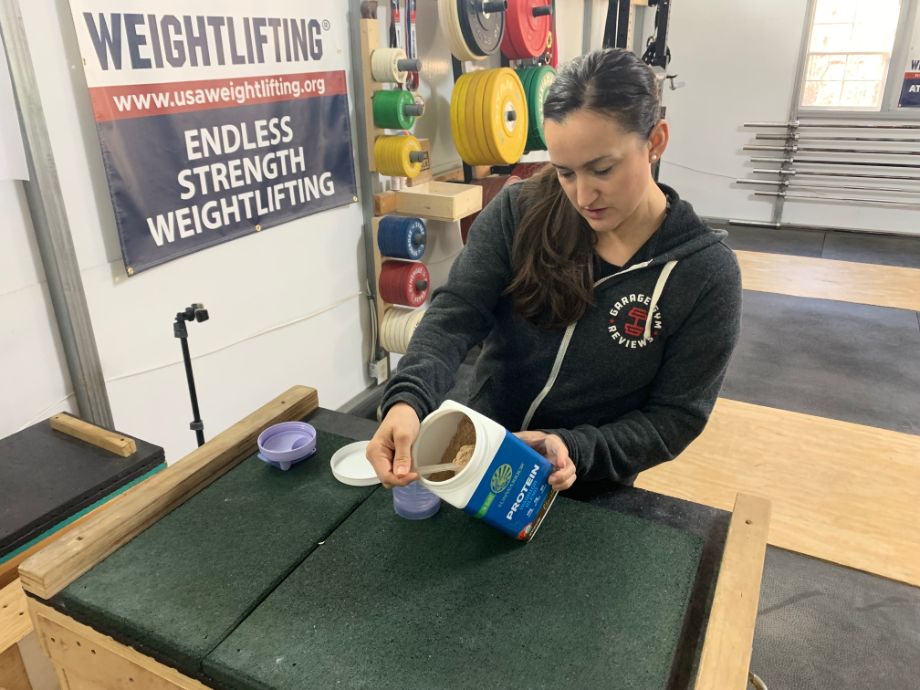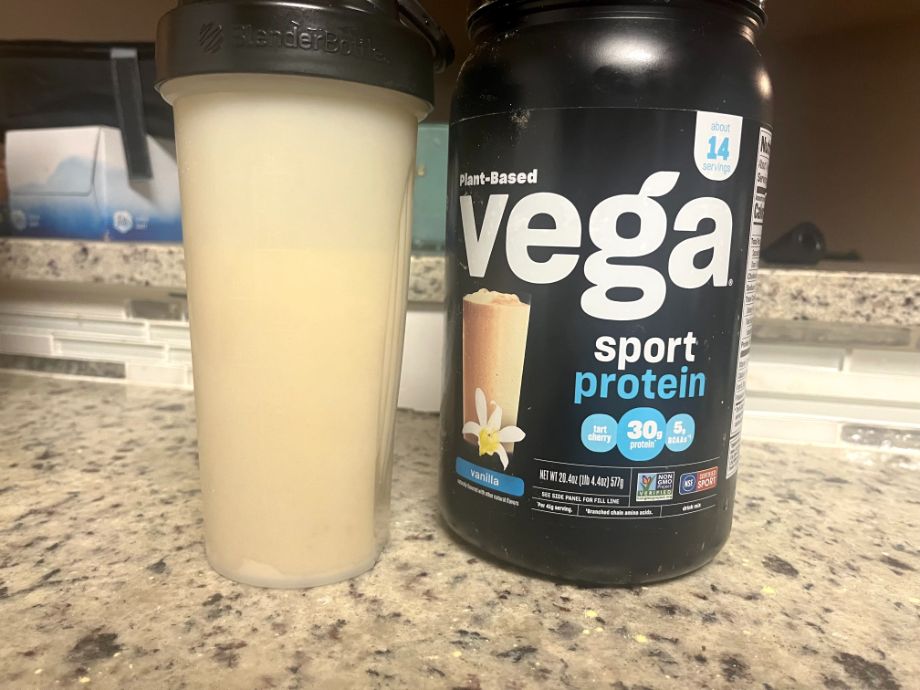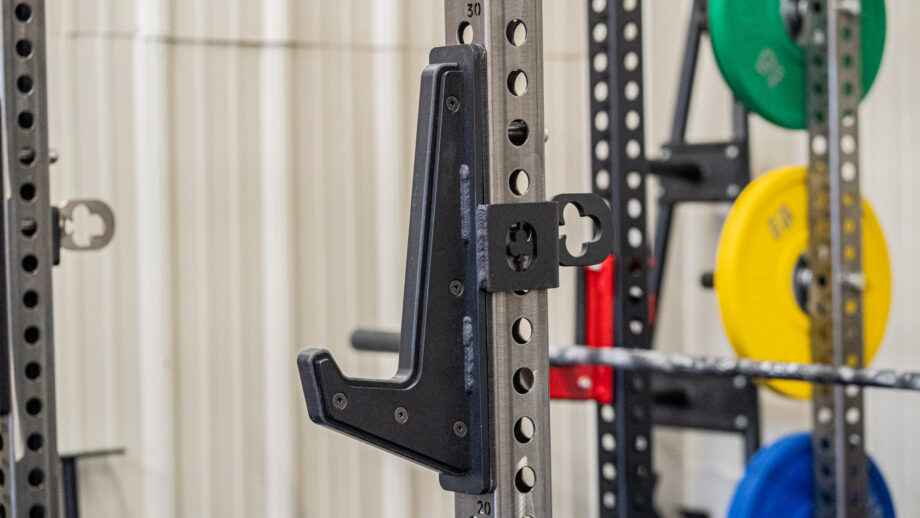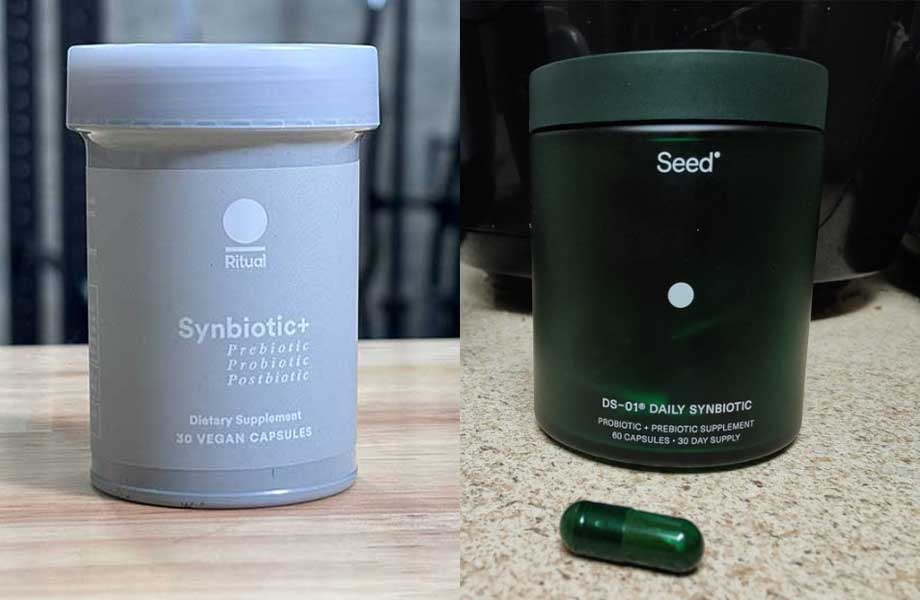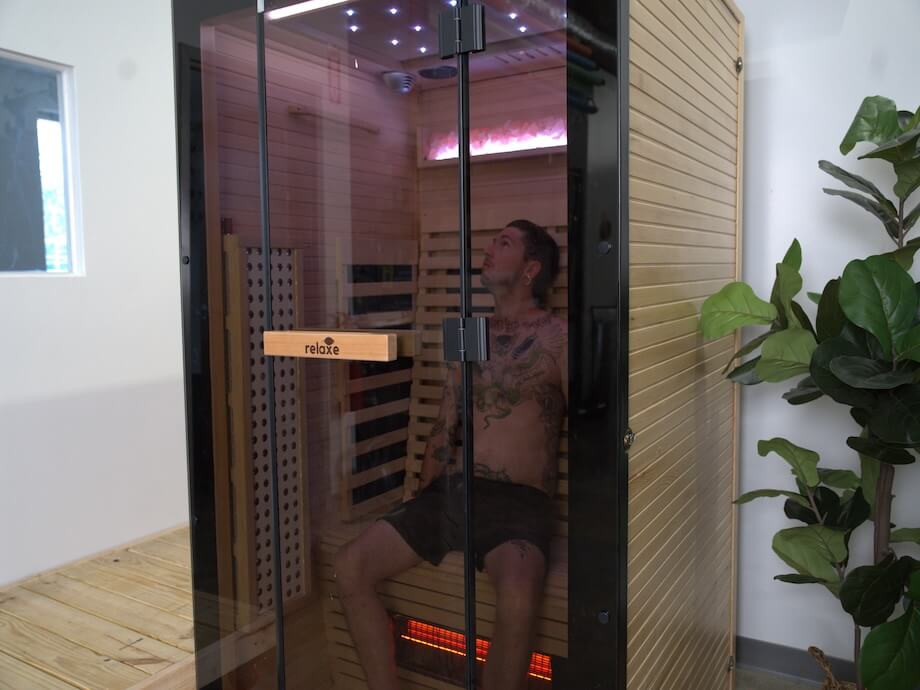Gone are the days of drinking raw eggs, a jug of milk, and dairy-based protein shakes to reap the benefits of protein. As more and more consumers show interest in plant-based diets, the supplement industry has delivered…with peas! I never would’ve imagined those peas I picked out of my meals as a kid would sit in my pantry as a protein powder as an adult (yet a kid still at heart).
I am a registered dietitian who has spent years helping clients understand the importance of quality protein intake. The team at Garage Gym Reviews—comprised of certified sports nutrition coaches, competitive weightlifters, and certified personal trainers—and I have personally tested more than a dozen products to find the best pea protein powder supplements on the market by evaluating protein content, the quality of additional ingredients, taste, solubility, and more.
RELATED: The Best Protein Powder
Medical disclaimer: This article is intended for educational and informational purposes only. It is not intended as a substitute for medical advice. For health advice, contact a licensed healthcare provider.
Best Pea Protein Powder
- Best Overall Pea Protein Powder: Transparent Labs Rice & Pea Protein
- Best Natural Pea Protein Powder: Ritual Essential Protein 18+
- Best Low-Sugar Pea Protein Powder: Onnit Plant Protein
- Best Organic Pea Protein Powder: Naked Nutrition Pea Protein
- Best Unflavored Pea Protein Powder: Bulk Supplements Pea Protein Isolate
- Best-Tasting Pea Protein Powder: Truvani Plant Protein
- Best Budget Pea Protein Powder: Anthony’s Pea Protein
- Best Vegan Pea Protein Powder: Sunwarrior Protein Warrior Blend
- Best High-Protein Pea Protein Powder: Vega Sport Plant Protein
What Is Pea Protein?
Before jumping into our top picks, let’s explore what pea protein powder is. For starters, peas are a type of pulse—the edible seed from a legume plant—naturally high in plant-based protein, dietary fiber, and various micronutrients such as calcium and iron.
As a supplement, pea protein1 often comes in pea protein concentrate and pea isolate:
- Pea protein concentrate: may contain other pea compounds, although it still has a high protein content
- Pea protein isolate: the pea protein is isolated from the other compounds in peas, resulting in a pure protein
As a plant-based protein, people often wonder, “Is pea protein a complete protein?” Technically, because pea protein2 contains all essential amino acids, it is considered a complete protein. However, pea protein is relatively low in methionine and cysteine compared to other plant and animal-based proteins.
Although there are plenty of plant-based protein powder benefits, pea protein is a dietary supplement, so it’s important to remember that it should supplement a balanced and varied diet. If you consume other high-protein foods, whether animal or plant-based, you are sure to nourish the body with all essential amino acids.
And, truly, pea protein is a highly appealing plant protein, even on its own. Although a smaller study, 2019 research published in Sports3 found that whey and pea protein produces similar effects on body composition and athletic performance.
Also, unlike other protein powders, pea protein is not derived from one of the eight most common food allergens—milk, eggs, peanuts, tree nuts, soy, fish, shellfish, and wheat. This makes pea protein a suitable option for various dietary patterns.
So whatever your nutritional agenda, one of these pea protein powders could be great for you!
Best Overall Pea Protein Powder: Transparent Labs Rice & Pea Protein
Good for: Those who prioritize organic supplements and products
Best Overall
Transparent Labs Organic Vegan Plant-Based Protein Isolate
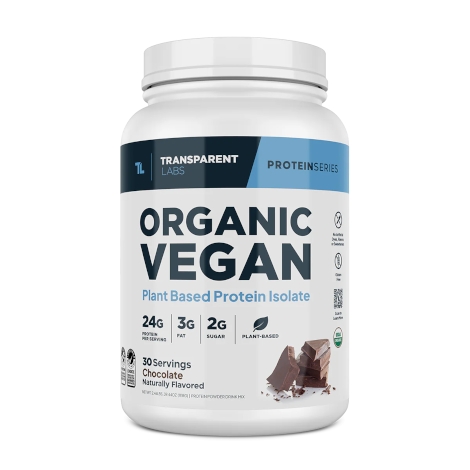
Product Highlights
- A rice and pea protein powder
- Rated with 4.3 stars on their website
- Comes in 2 flavors
- 24 g of protein per serving
- Organic product with minimal ingredients
Pros & Cons
Pros
- No artificial sweeteners, colors, or preservatives
- Organic and vegan
- Only 5-7 ingredients
- Reviewers love the taste
- 24 g of protein per serving
- Subscribe and save
- 30-day money-back guarantee
Cons
- Only 2 flavors
- Stevia can cause GI issues for some
- Expensive
Bottom Line
This organic rice and pea protein powder is a good choice for people who want a clean plant-based protein option with minimal ingredients.
Best Natural Pea Protein Powder: Ritual Essential Protein 18+
Good for: Anyone who’ looking for a pea protein powder with no artificial ingredients
Best Natural
Ritual Essential Protein Daily Shake
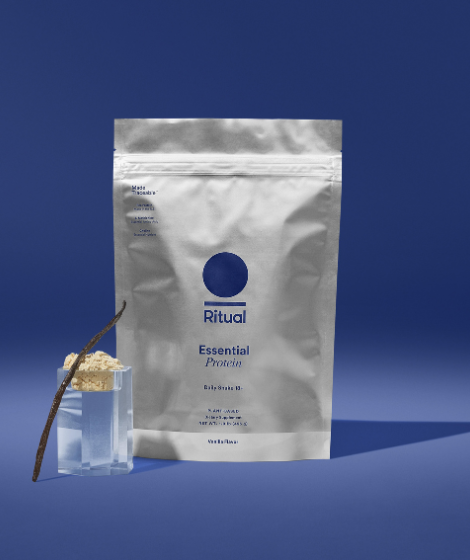
Product Highlights
- Organic pea protein powder
- 20 g of protein per serving
- Formulated to support adults 18-49
- Third-party tested
- 150 mg of choline per serving
Pros & Cons
Pros
- Soy-free, gluten-free, and vegan-friendly
- No artificial sweeteners
- Complete amino acid profile
- Non-GMO
- USA-grown peas
Cons
- Only comes in one flavor
- Price per serving is on the high end
- Velcro bag closure ineffective
Bottom Line
Ritual’s Essential Protein Daily Shake has 20 grams of protein per serving and 150 milligrams of chlorine (to support brain and nervous system function). This protein powder from Ritual is third-party tested and Informed Sport Certified, which means this formula has been screened for over 250 banned substances.
Best Low-Sugar Pea Protein Powder: Onnit Plant Protein
Good for: Minimizing sugar intake with maximum plant-based protein
Best Low-Sugar
Onnit Plant-Based Protein
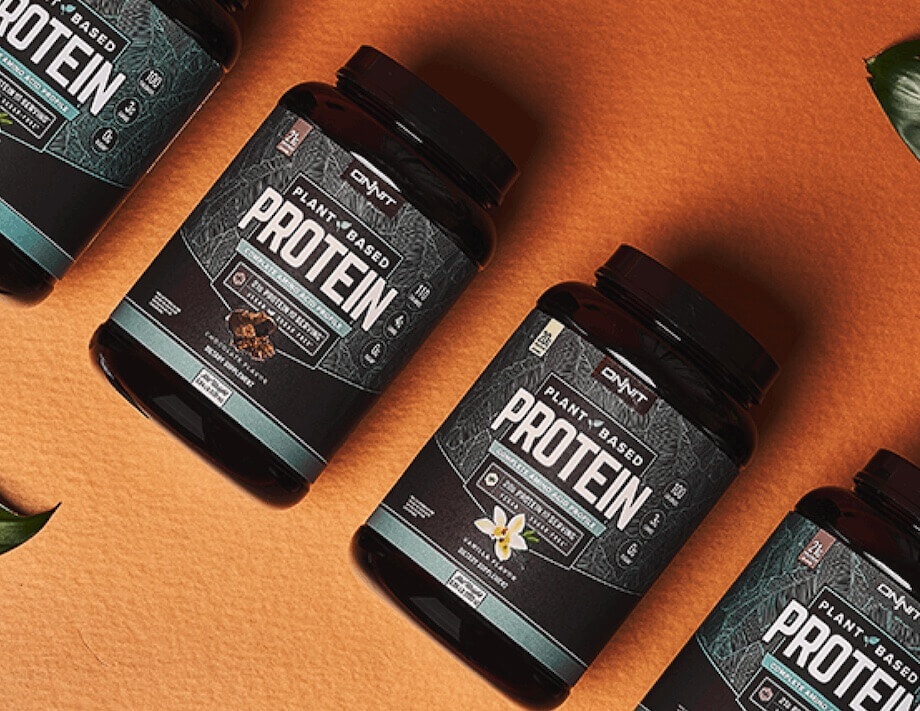
Product Highlights
- Pea-, pumpkin-, sunflower-, and watermelon-seed protein powder
- Vegetarian and vegan
- Dairy-, soy-, and gluten-free
- Available in chocolate and vanilla
Pros & Cons
Pros
- Informed Sport-certified
- Vegan
- Dairy-, soy-, and gluten-free
Cons
- Vanilla flavor is poorly reviewed
- Only 20 servings per container; customers want larger serving size tubs
- Some reviewer complain it doesn’t mix well
Bottom Line
Onnit’s Plant-Based Protein mixes a variety of protein sources. Customer reviews are much more positive for the chocolate flavor.
Best Organic Pea Protein Powder: Naked Nutrition Pea Protein
Good for: Anyone looking for a high-quality, pure pea protein powder
Best Organic
Naked Nutrition Naked Pea
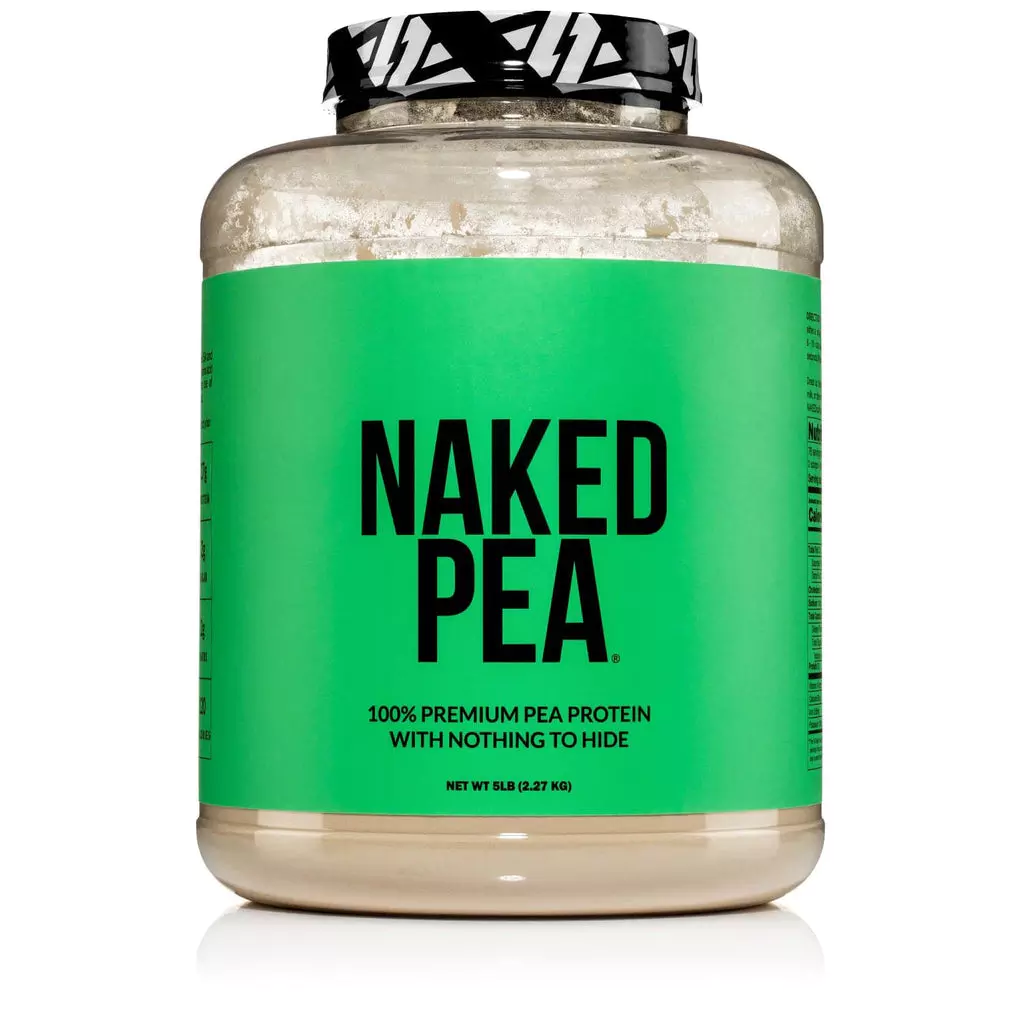
Product Highlights
- Pea protein powder
- Certified vegan
- Informed Choice-certified
- Dairy-, gluten-, and soy-free
Pros & Cons
Pros
- Minimal ingredients: only 1 for unflavored and 3 for flavored
- No artificial flavors, sweeteners, or colors
- Customers share it is easy on stomach
- Informed Choice-certified to be banned substance-free
Cons
- Mixed reviews on taste
- Mixed reviews on mixability
- 1 serving is 2 scoops
Bottom Line
This pea protein powder has 25 to 27 grams of protein depending on the flavor. There are no artificial flavors, colors, or sweeteners. It is also third party-tested for banned substances.
Best Unflavored Pea Protein Powder: Bulk Supplements Pea Protein Isolate
Good for: Anyone wanting to sneak plant protein in their diet
Best Unflavored
Bulk Supplements Pea Protein Isolate
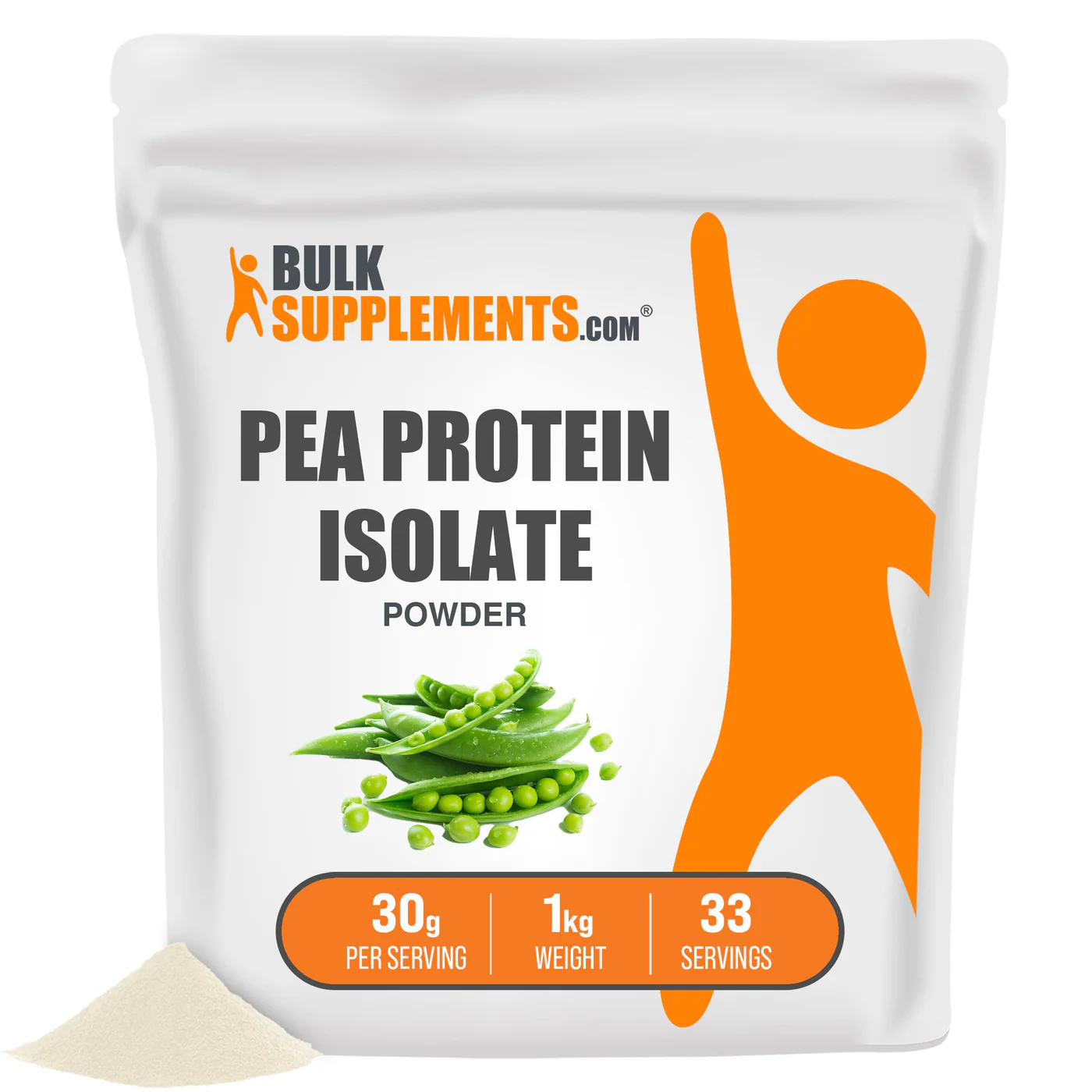
Product Highlights
- Pea protein isolate
- Gluten-, soy-, and lactose-free
- No additives
Pros & Cons
Pros
- 1 ingredient: pea protein isolate
- Vegan
- No additives
- Large variety of sizes available
- Affordable multiple sizes at less than $1 per serving
Cons
- Only save 5% with subscription
- Larger sizes are sold out
- No scoop included
- Users share it doesn’t mix well
Bottom Line
Bulk Supplements Pea Protein Isolate is a very affordable pea protein option for customers looking to add a vegan protein without breaking the bank.
Best-Tasting Pea Protein Powder: Truvani Plant Protein
Good for: Shocking your tastebuds with a plant-forward protein blend
Best-Tasting
Truvani Organic Plant-Based Protein Powder
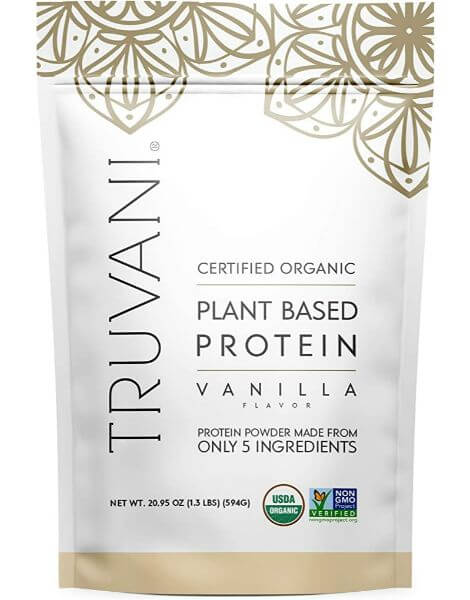
Product Highlights
- Made with 6 organic ingredients
- Rich chocolate flavor
- A USDA-certified organic, vegan, dairy-free, soy-free, and non-GMO product
- 20 grams of protein per serving
- Has 4.4/5 stars on Amazon and 14,000+ reviews
- #4 in Sports Nutrition Pea Protein Powders on Amazon
- Store in a cool and dry place
Pros & Cons
Pros
- No added sugars or stevia
- Does not have a chalky or grainy taste
- Reviewers love the chocolate flavor
- Paleo-friendly
- Organic
- Vegan
- Certified gluten-free
Cons
- Expensive (about $2.50 per serving)
- Made in a facility that processes wheat, tree nuts, shellfish, fish, peanuts, and eggs
Bottom Line
The chocolate flavor is a fan favorite, especially on Amazon, as Truvani’s Chocolate Protein Powder is rated #4 in Sports Nutrition Pea Protein Powders at the time of writing. We’ve found that reviewers love this product for its taste and simple ingredients.
Best Budget Pea Protein Powder: Anthony’s Pea Protein
Good for: Enhancing protein intake without depleting your wallet
Best Budget
Anthony’s Premium Pea Protein

Product Highlights
- Pea protein with 8 g of protein per serving
- Unsweetened and unflavored
- Vegan and vegetarian
Pros & Cons
Pros
- Discounts for buying multiple bags
- Batch tested and verified gluten-free
- Only 1 ingredient: pea protein isolate
- No additives
Cons
- Only available in 2 lbs size
- Low protein per serving: 8 g
- Small serving size: 10 g other brands closer to 20–30
- Users report difficulty resealing bag
Bottom Line
Anthony’s Pea Protein has a smaller serving size and protein per serving than many of their competitors. With only one ingredient and no additives, if you are looking to add a little bit of protein to your routine, this may be a good option.
Best Vegan Pea Protein Powder: Sunwarrior Protein Warrior Blend
Good for: Keto and plant-based dieters hunting for a unique protein blend
Best Vegan
Sunwarrior Warrior Blend Protein Powder
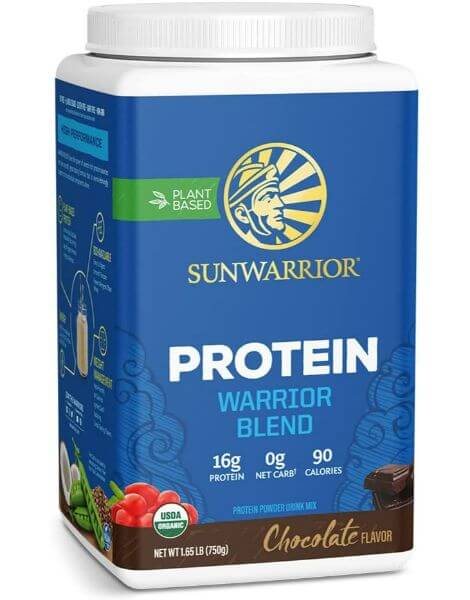
Product Highlights
- 7 great flavors, including unflavored option
- Plant-based, gluten-free, kosher, and vegan
- 16 grams of protein per serving
- For muscle building, repair, and meal replacement
- Certified organic and non-GMO
Pros & Cons
Pros
- 0 grams of net carbs and only 90 calories
- Container made from 100% recycled and recyclable materials
- Includes a detailed amino acid profile
- A plant-based protein made from peas and hemp
Cons
- Only 17 g of protein per serving
- Stevia can cause GI distress for some people
- Some reviewers do not enjoy the taste
Bottom Line
With 4.5 stars and over 12,000 reviews, this product speaks for itself. Sunwarrior has created an affordable, delicious, inclusive, and adequate protein powder you’ll love.
Best High-Protein Pea Protein Powder: Vega Sport Plant Protein
Good for: Anyone searching for a mega dose of plant-based protein
Best High-Protein
Vega Sport Premium Protein
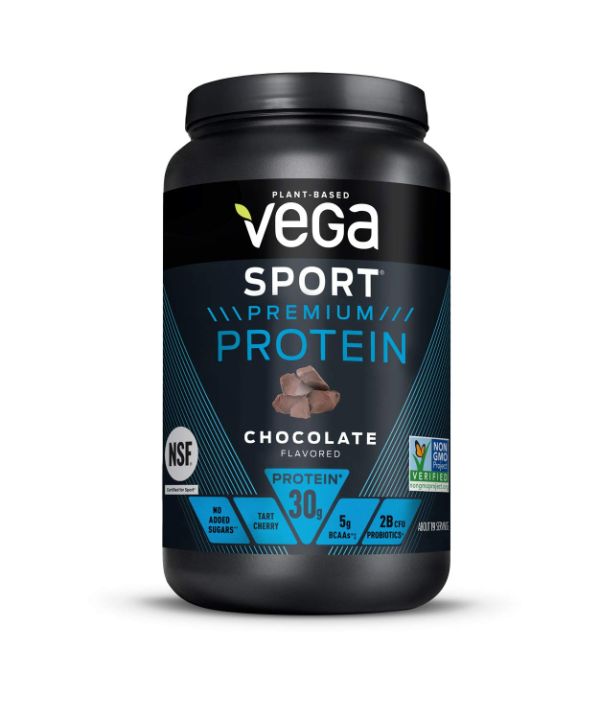
Product Highlights
- Multi-source vegan protein powder
- NSF Certified for Sport, vegan, and gluten-free
- Includes BCAAs, probiotics, and tart cherry
Pros & Cons
Pros
- 30 grams of protein per serving
- Contains all essential amino acids but two that are made by the body
- 5 flavor options
- Supports recovery with tart cherry, probiotics, and turmeric extract
Cons
- Customers share new formula doesn’t blend well
- Pricey at over $2 per serving
Bottom Line
Vega Sport Protein is plant-based, third-party tested, and gluten-free, making it suitable for a wide variety of people. One scoop provides 30 grams of vegan-friendly protein. Our testers report taste and blendability is not comparable to whey protein, but far better than other vegan-friendly options on the market.
Other Pea Protein Powder We Researched
If you’re curious about more great products on the market, check out other pea protein powders we researched and recommend:
- Garden of Life Vegan Sport Protein
- KOS Vegan Superfood Protein Powder
- NOW Sports Nutrition Pea Protein
- Orgain Organic Plant Protein
How We Picked and Tested the Best Pea Protein Powder
Interested in our selection process? We’ll let you in on our little secret—here’s how we picked and tested the best pea protein powders based on our intricate supplement testing methodology for protein:
- Protein sourcing and variety: All of our pea protein powders contain high-quality protein, including pea protein with some blended with other plant-based proteins. This allows consumers to choose single or multi-protein blends to fit their protein needs best.
- Additional ingredients: If other ingredients are added to the pea protein, we ensure there’s a rhyme and reason to their inclusion.
- Flavor options: Recognizing that not everyone has the same palates, you’ll always find flavor variety (and even unflavored options) on our lists.
- Third-party testing: We strive to find dietary supplements that are third-party tested, and all of our top pea protein powder picks have undergone such rigorous testing.
- Cost: We always accommodate various budgets so that most, and hopefully all, of our readers can enjoy the products we recommend.
- Brand reputation: We believe that the brand behind the product deserves as much, if not more, investigation. A better understanding of the company and its values allows us to confidently recommend its products to our readers.
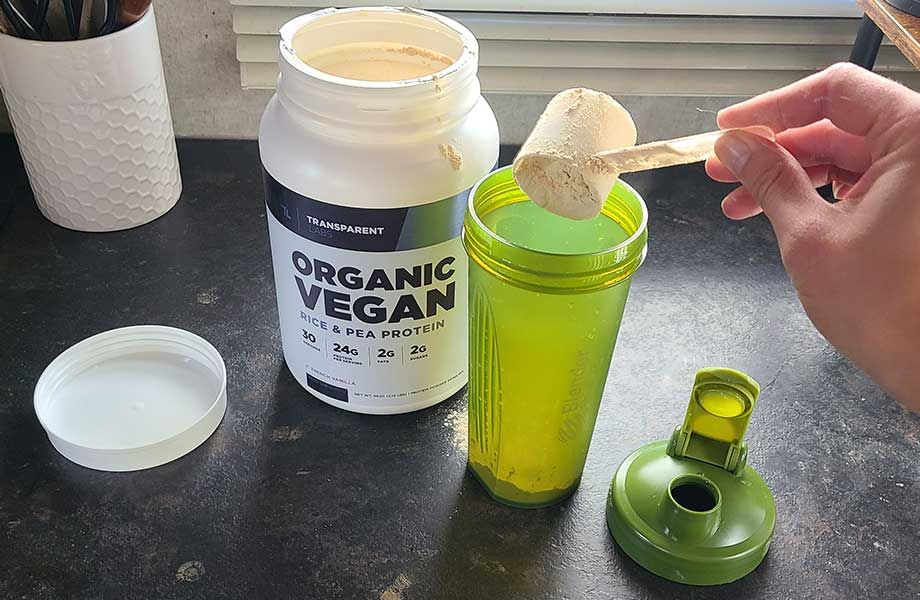
Benefits of Pea Protein Powder
Whether you’re on the fence about pea protein or a nutrition nerd like we’re proud to be, here’s how pea protein powder can benefit and enhance your lifestyle:
Inclusive Protein Option
Because pea protein is free of common allergens and lactose, it’s an inclusive protein option for a broad range of people. And not to mention, even if not following a vegetarian or vegan lifestyle, all animal and plant-based dieters can enjoy pea protein!
Supports Body Composition Goals
Whichever your body composition goal—like weight loss10, building muscle mass, or maintaining your body weight—pea protein can support your endeavors, just like any other form of protein.
Promotes Heart Health
According to a 2020 research review11, pea protein offers impressive heart health benefits. In animal and human studies, pea protein improves blood cholesterol and pressure levels, two major risk factors of heart disease if left uncontrolled.
Pea protein offers impressive heart health benefits. In animal and human studies, pea protein improves blood cholesterol and pressure levels, two major risk factors of heart disease if left uncontrolled.
2020 Research Review
Provides Additional Minerals
Pea protein is often rich in essential minerals like calcium, phosphorus, potassium, iron, and sodium. Each mineral has its own unique roles in the body, but together, they can help support bone, heart, neuromuscular, metabolic, and overall health.
Offers Versatile and Convenient Utility
While you might’ve scooted peas off your plate as a kid (and still might—no judgment here), pea protein powder can redeem itself as a totally convenient and versatile ingredient—drink as an on-the-go protein shake, blend into a post-workout smoothie, mix into your oatmeal, and so much more.
Dosing and Interactions
The amount of protein you need depends on your unique macronutrient needs that reflect your age, birth sex, activity level, and other factors. We’ve taken a deep dive to answer “How much protein do I need?,” but here are the cliff notes:
- For general health, aim for 0.8 grams of protein per kilogram (g/kg) or 0.35 grams per pound (g/lb) of body weight per day. For someone weighing 200 pounds, this would amount to 70 grams of protein daily.
- To build and maintain muscle while supporting exercise performance, consume between 1.4-2.0 g/kg of protein daily. This equates to 127 to 182 grams of protein per day based on the same 200-pound individual.
Ideally, you should get most of your daily protein needs from high-protein foods. However, supplementing with a protein powder can help you hit your protein targets if you struggle to get enough protein, find yourself in a protein pinch, or just want a shelf-stable option.
Also, while pea protein has no known interactions12 at this time, there are certain safety call-outs to consider. For instance, pea protein powder can be unsafe for those managing kidney disease due to its high protein and potentially higher sodium, potassium, and phosphorus content.
Despite being hypoallergenic, pea protein might be cross-contaminated with common allergens during manufacturing. It’s essential that you review its certifications and processing guidelines for this reason, especially if managing a celiac disease or major food allergy.
We encourage you to consult with a dietitian if you have questions and concerns regarding your dietary needs and safety. They can advise a nutritional plan for your personal needs and guide you in finding a safe and reputable protein powder—pea-based or not—like the ones we reviewed above.
Third-Party Testing
Because the Food and Drug Administration does not tightly regulate dietary supplements, we encourage choosing third-party tested products. Third-party testing means the product has undergone rigorous testing and contains what it claims to have.
Common third-party verifications include:
- NSF Certified for Sport
- Informed Choice
- Banned Substances Control Group
Third-party verifications can also be helpful if you have specific dietary restrictions, needs, and preferences like:
- Certified Gluten-Free
- Certified Kosher
- Certified Vegan
- Non-GMO Project Verified
- USDA Organic
Verifications and certifications should be visible on the product’s container and the company’s website. If you’re still questioning a product’s manufacturing and testing protocols, you could always contact the respective customer service team or opt for another product with clearly visible marks and logos.
Buying Guide: What to Look for in Pea Protein Powder
Before confirming your purchase, we recommend running through these tips to ensure the pea protein powder is right for you.
Protein Content and Sources
When looking for a pea protein powder, consider how much protein you’d like to obtain for it and any other added protein sources. Of course, you can always adjust the portion size, but protein powders with a denoted serving size (and scoop) help take out the guesswork about the amount of protein you’d expect to consume.
Generally, someone who lacks diet diversity might benefit more from a pea protein blend—such as with rice or chia seeds—than someone who regularly consumes various food sources.
Dietary Restrictions and Preferences
Pea protein tends to be a suitable alternative to other dairy and plant-based proteins, although you should still factor in your own dietary restrictions and preferences. For instance, some pea proteins contain more sodium than others, which is essential to recognize for those watching their sodium intake.
Other pea proteins have other added ingredients—like probiotics and digestive enzymes—that might be beneficial but not always preferred by consumers. Also, pay attention to unwanted ingredients like added sugars, fillers, and preservatives.
Certifications and Verifications
We’ll always encourage you to review the product of interest’s certifications and verifications, or at least ensure it’s third-party tested and manufactured in NSF-certified, FDA-inspected, and cGMP-compliant facilities.
Other certifications a product holds are often a personal choice, including if it’s Certified USDA Organic and Certified Gluten-Free. Choosing an Informed-Sport-certified product is also wise if you’re a competitive athlete.
Brand Dignity
Before purchasing a product, it’s never a bad idea to analyze the company’s dignity behind it. While values and integrity can waver from one person to the next, the GGR team is always peeking into the company’s mission and values, access to customer service, return policies, and consumer reviews.
FAQs About the Best Pea Protein Powder
Which is better, hemp or pea protein powder?
What’s better for you isn’t always better for the next person, as there are many factors to consider related to dietary restrictions and preferences. Both are good sources of protein, but hemp also has dietary fiber and numerous minerals. Pea protein, however, can elicit a satiety response, making you feel full for longer. That said, a blend of these proteins will ensure an abundance of essential amino acids without much risk to anyone with allergies.
Is pea protein actually good for you?
Pea protein is a great plant-based protein that contains all essential amino acids, although it’s relatively low in methionine and cysteine. Diversifying your other protein sources can help fill in these amino acid gaps.
Is pea protein powder good for your kidneys?
Barring no dietary restrictions and health concerns, drinking pea protein every day is considered safe. In particular, plant-based protein powders (like pea protein) are generally safer and healthier for consumers with kidney problems. Still, you should aim to get most of your protein intake from whole food sources and supplement as needed.
How do I choose pea protein powder?
Choose a pea protein powder that best fits your dietary needs and preferences, including if it’s joined with other protein sources for amino acid diversity and other beneficial ingredients—like probiotics—as desired. Also, pick an unflavored or flavored option you’re likely to enjoy, aiming for natural ingredients over artificial ones, and strive to choose a pea protein that’s been third-party tested at a minimum.
How does pea protein compare to other protein powders?
One criticism of plant protein is that it’s often called “incomplete.” However, pea protein is a complete protein in that it contains all nine essential amino acids. Therefore, for people who cannot or do not want to consume animal protein, pea is a great option. It elicits similar responses in the body and counts toward a daily protein intake.
These statements have not been evaluated by the Food and Drug Administration. This product is not intended to diagnose, treat, cure, or prevent any diseases.
References:
- Institutions as Conscious Food Consumers. Pea Protein. 2019.
- Berrazaga I, Micard V, Gueugneau M, et al. The Role of the Anabolic Properties of Plant- versus Animal-Based Protein Sources in Supporting Muscle Mass Maintenance: A Critical Review. Nutrients. 2019;11(8):1825. Published 2019 Aug 7. doi:10.3390/nu11081825
- Banaszek A, Townsend J, Bender D, et al. The Effects of Whey vs. Pea Protein on Physical Adaptations Following 8-Weeks of High-Intensity Functional Training (HIFT): A Pilot Study. Sports. 2019;7(1):12. doi:https://doi.org/10.3390/sports7010012
- Rice Bran and Rice Bran Oil. Rice Protein. 2019.
- Joy JM, Lowery RP, Wilson JM, et al. The effects of 8 weeks of whey or rice protein supplementation on body composition and exercise performance. Nutr J. 2013;12(1). doi:https://doi.org/10.1186/1475-2891-12-86
- Zhao H, Shen C, Wu Z, Zhang Z, Xu C. Comparison of wheat, soybean, rice, and pea protein properties for effective applications in food products. J Food Biochem. 2020;44(4). doi:https://doi.org/10.1111/jfbc.13157
- Dotto JM, Chacha JS. The potential of pumpkin seeds as a functional food ingredient: A review. Sci Afr. 2020;10:e00575. doi:https://doi.org/10.1016/j.sciaf.2020.e00575
- Grancieri M, Martino HSD, Gonzalez de Mejia E. Chia Seed (Salvia hispanica L.) as a Source of Proteins and Bioactive Peptides with Health Benefits: A Review. Compr Rev Food Sci Food Saf. 2019;18(2):480-499. doi:https://doi.org/10.1111/1541-4337.12423
- Vidović BB, Milinčić DD, Marčetić MD, et al. Health Benefits and Applications of Goji Berries in Functional Food Products Development: A Review. Antioxidants (Basel). 2022;11(2):248. Published 2022 Jan 27. doi:10.3390/antiox11020248
- Westerterp-Plantenga MS, Nieuwenhuizen A, Tomé D, et al. Dietary Protein, Weight Loss, and Weight Maintenance. Annu Rev Nutr. 2009;29(1):21-41. doi:https://doi.org/10.1146/annurev-nutr-080508-141056
- Stilling K. Health Benefits of Pea Protein Isolate: A Comparative Review. SURG Journal. 2020;12(1). doi:https://doi.org/10.21083/surg.v12i1.6111
- WebMD. Pea Protein—Uses, Side Effects, and More.


